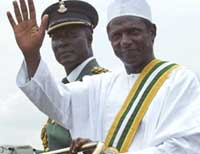Nigeria's new president faces uphill struggle
In his first two months in office, the shy, aristocratic new president of Nigeria has faced a nationwide strike, violence in the country's oil region and accusations he's timid - he only announced a Cabinet last week.

But these problems pale compared to the jaw-dropping corruption, decayed infrastructure and widespread poverty that 140 million Nigerians are expecting President Umaru Yar'Adua to tackle.
"These big men always have big talk," grumbled Raymond Olanre as he hawked newspapers on a potholed road. Yar'Adua "says he will give us water and light, but that is just what the previous (president) said."
Like many Nigerians, Olanre fears Yar'Adua's links to former President Olusegun Obasanjo may prevent him from challenging a corrupt status quo. The ex-president plucked the former governor from obscurity and shoehorned him through the governing party's presidential nomination last year.
Yar'Adua's landslide in April's elections was condemned by domestic and international observers, who charged widespread voter intimidation and vote-rigging.
Now Nigerians are asking whether Yar'Adua, a reclusive former chemistry teacher from a royal Muslim family, will be able to stand up to his flamboyant and strong-willed predecessor and force through desperately needed reforms.
Under Obasanjo, Nigeria had eight tumultuous years of democracy, the longest period since independence from Britain in 1960. But corruption was rife and most people have remained desperately poor despite the nation's oil wealth. Nigeria is Africa's largest crude exporter, an OPEC member and key supplier to the West.
Olanre earns about US$2 (EUR 1.46)a day, not much - but still more than most. At 22 years old, he has lived more than half the 43-year life expectancy of the average Nigerian.
There are signs Yar'Adua is preparing for real change, says Jibrin Ibrahim of Nigeria's Center for Democracy and Development, a civil society think tank. But every gain also shows how far the administration has to go.
In a surprising move, Yar'Adua publicly declared his assets - the first Nigerian president to do so - and urged his officials to do the same. No official has so far, and on Sunday, Yar'Adua's bowler-hatted vice president, Goodluck Jonathan, told reporters in response, "I don't see any big deal."
Yar'Adua reversed the contentious sale of two of the country's broken down refineries to a shadowy consortium headed by Obasanjo's allies, a deal hurried through in the dying days of the old president's regime. Incompetent management, sabotage and neglect had already shut country's four refineries. Dependence on imports of refined petroleum pushes prices up and government popularity down.
And this month, four former state governors were charged with stealing state money, with more arrests promised by the country's anti-corruption watchdog. A positive sign, no doubt. But none of the four held office in one of the three major oil producing states, whose governors receive billions of dollars (euros) annually but have failed to provide electricity, water, schools or clinics for their frustrated residents. Each was a major donors to the ruling party, however.
"People in the Delta will not take Yar'Adua seriously until we see some of our own governors being brought to book," said Damke Pueba, an activist with civil society group Stakeholders Democracy Network.
"He's still using the same Obasanjo approach," she said, referring to the previous president's policy of charging political enemies with corruption and allowing major party donors a free hand. "Some (officials) are sacred cows, others are sacrificial lambs."
In the meantime, a string of bombings and kidnappings that sharply escalated from December 2005 has cut a quarter from the 2.5 million barrels of oil that Nigeria can produce daily.
In the commercial capital, Lagos, the roar of generators outside businesses testify how urgently the country's power sector needs reform. Rich areas of the city may receive a few hours of electricity a day; blackouts of days or weeks are common in poorer neighborhoods.
The lack of power strangles small businesses and drives away investment in a country where millions are unemployed. Yar'Adua declared energy a national emergency and heads the ministry himself, although he will have three junior ministers reporting to him. Similar tactics by his predecessor failed to produce any results.
"He is very cautious, to the point of being faulted," said Charles Dokubo of the Nigerian Institute for International Affairs. "The appointment of the ministers took a lot of time because the outgoing administration still had interests in who was appointed .... Nigerians want (Yar'Adua) to prove to them that he does not need a back-seat driver."
The new administration contains many familiar faces from the Obasanjo administration or the governing party. But there are also two members of the opposition, seven women, and a finance minister seen by many as a reformist. Yar'Adua has promised to bring in more opposition members later.
Ibrahim of the Center for Democracy says it is too early to say whether the quiet new president may overcome an election many see as illegitimate and push through reforms.
"Obasanjo didn't have a clue what Yar'Adua thought of any policy issues. He told him what to say, he never asked," Ibrahim said. The current Cabinet and policies, says Ibrahim, are a delicate balance between competing factions rather than a true reflection of what Yar'Adua may want. He predicts a few major reshuffles before long.
"It will take him a year before we know who he is," said Ibrahim. "He is still not totally in charge."
Subscribe to Pravda.Ru Telegram channel, Facebook, RSS!


